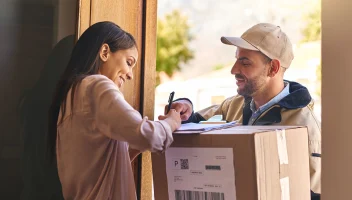The 7Cs of Home Delivery – Communication Is Key
The 7Cs of Home Delivery – Communication Is Key
The 7Cs of Home Delivery – Communication Is Key
12 Aug 2021
Aptean Staff Writer
Back in the 1970s, FedEx changed the game when it introduced the tracking number.
It raised the bar for other home delivery companies—they too had to offer a similar service. But beyond that: it completely shifted and shaped customer expectations.
Today’s consumers expect a lot when it comes to their deliveries. Not only do they want a tracking number (in fact, it’d be suspect if they weren’t provided one), but they also want proactive alerts on shipment progress through text or e-mail.
They want you to communicate the progress of their delivery—every single step of the way. So, communication with your consumers simply can’t be done half-way. Keep them informed, keep them up-to-date. Because when you do that, there are no surprises—unpleasant or otherwise—right up to the time of delivery.
In fact, day-of-delivery updates can alert customers to the exact delivery window—sending messages like, “On our way, see you in 30 minutes.” Customers also have the option to track a driver’s enroute location on an interactive map on their devices. And customers get reassurance about who their driver is, with personalization like, “Jim E. is 20 minutes away.”
Customers feel empowered by this kind of communication. Knowing exactly when you’re going to arrive means they’re able to make adjustments on their side—they know that they have time to run to the grocery store beforehand or that they won’t be interrupted on that call with their boss. Not only does this improve customer satisfaction, but it can also strengthen first-time delivery success rates. And that means you save on those significant redelivery costs.
Timely and accurate communication also shows the consumer that you have everything under control, increasing their confidence in your reliability. Crucially, they feel they can trust you to get the job done. Enhancing your last mile customer experience in this way encourages brand loyalty and repeat business.
So, if clear delivery communication can reduce costs and improve loyalty, we’d say it’s worth doing well.
For retailers that run their own fleets, retailers that tender out their deliveries to third-party carriers and carriers that delivery goods on behalf of multiple retailers, providing this end-to-end visibility is only possible if your home delivery system is integrated with your other supply chain systems. The systems are too interdependent to function successfully on their own.
For instance, a delay at the distribution center can trigger an early notice to the consumer of a schedule change, thereby increasing the chance of first-time delivery success. Interestingly, Digital Commerce 360 learned that retailers that proactively identified and communicated with customers to solve a problem actually got higher Net Promoter Scores than retailers that had no delivery issues.
Communication Is Key.
Even when a problem does arise and the delivery may be later than originally anticipated, clear and proactive communication can allow you to rebound and maintain high customer satisfaction levels.
Why? Well, it allows for the end-customer to plan their day accordingly. To shift their plans if the delivery was either ahead of or behind schedule. Time is the single greatest commodity we have. To show you value someone, you must communicate your timeliness.
Think about this on a personal level. When a co-worker is running late to a meeting or a friend isn’t on time for lunch, isn’t it frustrating? You’re just sitting there waiting.
But if that same friend or co-worker would have sent you a message saying they were running behind schedule, it shows a greater respect for your time. The same rules apply to home delivery services. You must let the customer know that you value and respect their time. Let them know if you’re off schedule.
Occasionally, changes may be needed after a route is planned, requiring interaction with customer service. That’s why your home delivery system should track every customer interaction that occurs during an order’s lifecycle, so all this information is accessible via a single interface. This lets customer service quickly resolve inquiries and issues. A better customer experience means more repeat buyers and referrals.
Getting last mile customer communication right is impossible without the right technology. Our home delivery software, Aptean Home Delivery, can transform your transportation operation. Can make communication seamless and second-nature. Can help you ensure the customer remains satisfied.
Are You Ready to Take Control of the Wheel? Find out how, now.
And be sure to come back next month. We’re going to cover our fifth C in the series: convenience. This C is all about how to keep your customers satisfied and coming back for more. They appreciate delivery options that match their lifestyles—with your software, you can provide just that.
If you’re just joining us and would like to read more about the 7 Cs, we’ve written a few posts already. First we wrote a brief overview of all 7 Cs, then we broke each C down and detailed the power of each of them in your home delivery operations.
First was choice. Then we wrote about certainty. Next was control. And here we are at communication.
Be sure to tune in next month. We’re going to detail the power of convenience in home delivery.
And if you’d like to read a more comprehensive resource on the 7 Cs of home delivery, you can download our home delivery eBook.
Related Blog Posts





Ready to start transforming your delivery business?
We’ve got the specialized TMS solutions you need to conquer your industry challenges.



